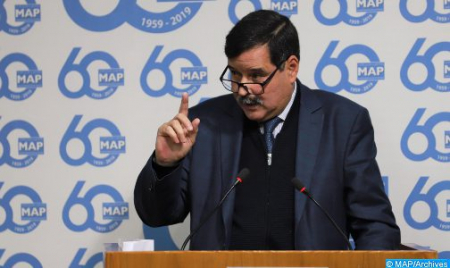Hatred against Morocco has Gripped Algerian Regime – Op-ed –
Hatred towards Morocco that has taken hold of the Algerian regime prevents it from noticing the transformations that took place on the international scene and the new concepts and criteria that result from it in terms of the management of States and their external relations, said the writer and journalist Talaa Saoud Al Atlassi. The world around Algeria has changed, moving towards a new positioning of its countries, its coalitions and their availability in terms of beneficial positioning, he pointed out in an op-ed published Tuesday by the news website “Machahid 24” under the title “the tragic circus of the Algerian regime”. Politics and economy are the two important areas in this new world map, he noted, stressing that at a time when the Algerian regime is still living to the rhythm of the old conceptions of the world, Morocco is accessing the paths of the future. This situation, he said, angers the generals of Algeria, a country which is further exacerbated because of its isolation from the new global situation, adding that the Algerian regime has failed to demonstrate strategic orientation in order to face these global changes, in a regional context having a direct impact on this country. In a broader global environment giving rise to transformations that shook a regime that was not sufficiently immune like that of Algiers, the events proving these global changes followed one another, Al Atlassi recalled. He noted, in this regard, that no one in this military regime was able to interpret these transformations and interact politically with them, in order to avoid the serious isolation in which it found himself, fuelled by its visceral hatred for Morocco. The writer and journalist underlined that the autonomy plan, proposed by Morocco on the basis of a balance between the strength of national legitimacy and the flexibility of realpolitik, offers the opportunity to “an honorable withdrawal for Algiers” from this conflict over the Moroccanness of the Sahara, stressing that this initiative responds to international transformations that favor political solutions to regional disputes. He noted that Algeria, which refused such an exit by continuing to nourish the separatist illusion, was shaken by the positive international interaction with the autonomy plan for the Moroccan Sahara, as evidenced by the positions expressed in this issue by the United States, Germany or, more recently, Spain. Mr. Al Atlassi recalled the recognitions of Morocco’s solution made by the Gulf countries, Egypt, Iraq, several African and Caribbean countries, as well as France which adopted the Moroccan proposal and advocated for it for years within the UN Security Council. Other European countries are called upon to express their support for the peaceful Moroccan approach for the settlement of the Sahara issue, knowing that Europe will move towards Africa, in the context of military operations in Ukraine and their economic consequences, he pointed out. He recalled the resolution adopted last October by the UN Security Council which solemnly proclaims the Moroccan autonomy plan as the benchmark for the global approach to the Moroccan Sahara issue. This position has pushed the Algerian regime into isolation, thus confirming the decline in its value on the international scene, he concluded.

